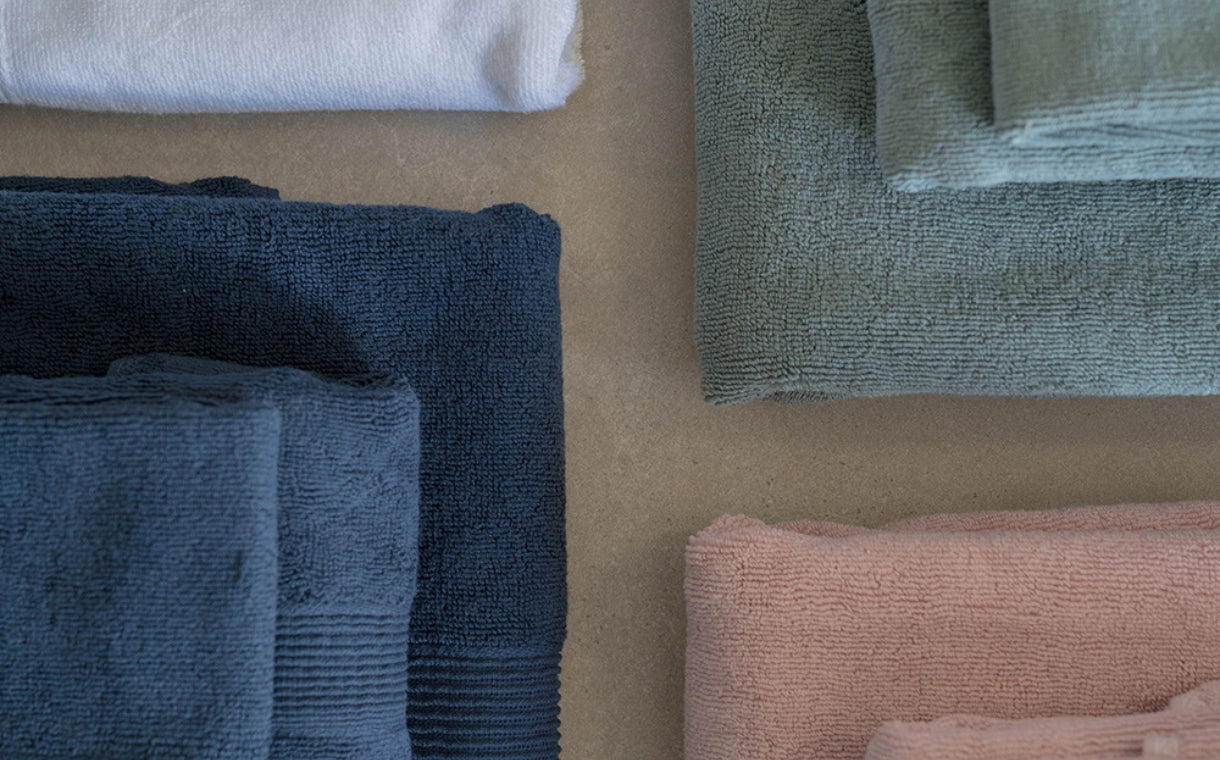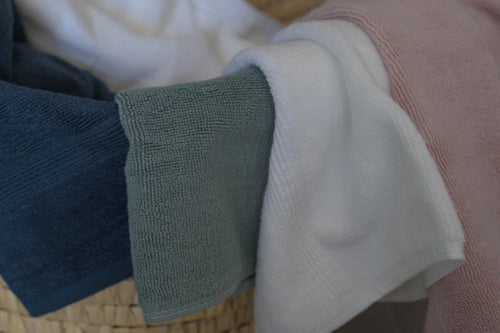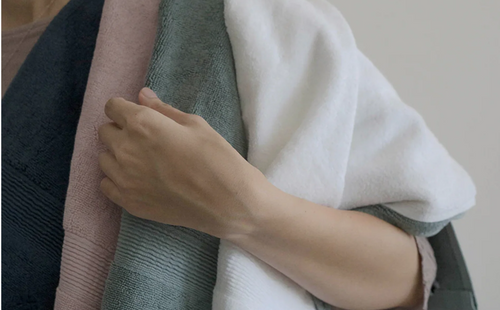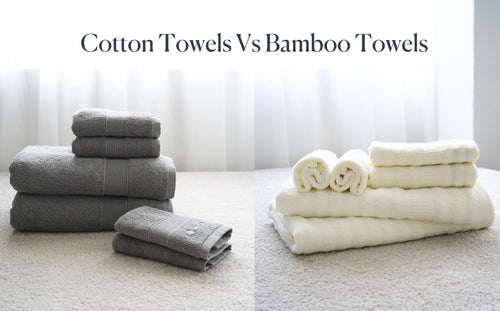Towels are among the top few essentials that can make your bathroom feel like a spa. As they’re the very first thing you reach out for after a relaxing shower, they can totally make or break your bath routine!
These big, fluffy, luxurious bathroom essentials that do a tremendous job of enveloping you in comfort also deserve to be treated right. Tossing them in the washer and calling it a day is a careless recipe for having the fabrics potentially lose their fluffiness, softness, and even absorbency.
So how to wash towels the right way? Read on to help you keep the fabrics in pristine condition and to give you a comfortable after-bath experience through and through!

Image By Karolina Grabowska From Pexels
Washing Towels Based On Material
Some fabrics are more sensitive than others so it pays to look into care labels or specific washing instructions per material before tossing them into the wash.
Cotton
100% organic cotton towels are typically soft, plush, and perfect for sensitive skin. They will need a mild detergent, 60 degrees temperature, and a fast spin cycle to wring out the moisture effectively. The same goes for Egyptian cotton towels.

Featuring Weavve’s Cotton Bath Towel
Linen
Linen towels are strong and durable yet require specific care. They should be washed in lukewarm water to protect their fibres. Bleaching must be avoided.
Bamboo
Bamboo towels are suitable to be washed at 40 degrees. They require a warm cycle with mild detergent and need to be air-dried. As with the rest of the material types, refrain from bleaching because it will damage the fabric. You can also iron them on medium heat if necessary.

Featuring Weavve’s Bamboo Fibre Towels
Microfibre
Microfibre holds a lot of dust, dirt, and grime. It can easily become a nuisance if not cleaned properly.
Now, how to take care of your microfibre towels? As part of your laundry routine, make sure to shake the dirty fabrics to remove excess dirt. Always wash them separately or with other lint-free items.
Use a mild detergent and a cold or warm wash cycle. Note that a hot cycle will remove the electric charge that helps dirt to cling to them. Stop the cycle halfway and let the laundry soak for 20 minutes before resuming.

Image By Engin Akyurt From Pexels
How To Wash Towels Properly: 9 Must-Know Tips
While the material type is important, there are some general rules of thumb that you should always follow.
Separate Dark And Light Colours
First things first. Separate darker towels from light-coloured ones and wash them into their own loads. Light-coloured fabrics, especially white ones, are prone to picking up some dye colour from the darker ones.
Now, who would want their most-cherished, chunky white towels to get discoloured and lose their lustre?

Image By Karolina Grabowska From Pexels
Wash White Towels With Hot Water
An easy trick to keep those whites bright and shiny is to wash them in hot water with a mild detergent. Washing towels at 90 degrees Celsius, however, might be too hot and can increase shrinkage. Try keeping the temperature to 60°C max, just enough to keep germs from spreading.
Bleaching might be effective in removing unwanted stains, but these agents weaken the fibres and eventually damage your bath essentials.
If you still want that whitening effect, try soaking them in a solution of baking soda and water. Washing new towels with baking soda will loosen and soften up the fibres, cleaning out any residue dirt or gunk. This helps in restoring your white fabrics to their original bright and fluffy glory. It also eliminates those pesky but inevitable musty odours.

Image By Engin Akyurt From Pexels
Don’t Overload The Washer
We know how tempting it is to just dump the entire hamper in the washer in one go and be done with it. We all have those days where fast-tracking everything seems only right.
But if you want to keep enjoying clean, soft, spa-like after-bath wrap, don’t overload your washer. A jam-packed washer won’t let the laundry rotate as freely or allow for the detergent to combine well with water and clean out all the stains. Overloading will also impact the bearings of your machine.

Image By Lum3n From Pexels
Use A Mild Detergent In Small Amounts
Using detergent in a large quantity doesn’t guarantee nicer cleaning. The only thing it results in is a thin film of residual detergent on the surface of the fabric. So the next time you think of using a handful of detergent with the hope of getting your laundry out cleaner and fluffier, think again. The detergent won’t rinse out properly and the product build-up damages the fibres making the texture stiff instead of softer.
The ideal amount of detergent for one load is two tablespoons which is more than enough to get them squeaky clean. Another great alternative is to opt for eco-friendly detergent sheets. Not only are they infused with excellent cleaning power, but they’re also toxin-free and gentle on the clothes and your skin.
As a pro tip, you can add ¼ cup of white vinegar to set the colour and remove any detergent residue.

Featuring Weavve's Silver-Infused Cotton Towels
Use Bleach For Stained Fabrics
Some stains can be too stubborn for a regular old detergent. If it seems absolutely necessary, you can use bleach in a moderate quantity to get the laundry clean. Chlorine bleach, admittedly, is a powerful tool to keep the fabrics sparkling white and get the stains out. But it’s important to properly dilute it to prevent any damage. Diluting 3/4 cup of bleach with a quart of water and adding it to the washer is a suitable way to use it.
Whites can also be washed with chlorine or non-chlorine bleach. But coloured ones should always be bleached with a non-chlorine (colour-safe) bleach containing hydrogen peroxide.
Replace Fabric Softener With Vinegar
It’s tempting to use fabric softener as you’re probably hoping for that extra cloud-like softness. But we suggest that you go for a natural alternative and replace fabric softener with white vinegar. While using a fabric softener once in a while or once every fourth wash is okay, the chemicals in it do tend to build up and make the fabric less absorbent over time.

Featuring Weavve’s Wool Dryer Ball
How to wash towels with vinegar? Add ¼ cup of distilled white vinegar to the washer. It won’t only soften the fabric but it will also remove bacteria and any musty odour.
You can also simply throw in some wool dryer balls to increase air circulation and promote fibre fluffiness.
Use A Gentle Machine Cycle
What setting to wash towels? Use a gentle machine wash cycle and a faster spin cycle to remove as much moisture as possible. A normal wash cycle can also better remove dirt and bacteria.

Image By DNE Stock project From Pexels
Use Hot For White & Warm For Dark Colours
As we mentioned before, white and light coloured fabrics are best washed in hot water. Hot water, ideally 60°C, brightens up light coloured ones. But remember this temperature is mostly for cotton.
For other fabrics like linen and bamboo, avoid temperatures higher than 40°C. Darker coloured ones can also be washed in warm water to prevent them from fading.

Image By Tima Miroshnichenko From Pexels
Dry Them Completely
We all know even the slightest moisture leaves odour. Before taking them from the dryer or rack, check the moisture level. Shake each of them if necessary to ensure there isn’t any excess water.
In terms of drying method, you can either choose to use a dryer or air-dry them. If you’re choosing to use a dryer, make sure that you run the cycle on low heat. Overheating can cause the fibres to tighten and stiffen making the fabric less absorbent. Once the cycle is complete, take out the load immediately and fold them to avoid wrinkles.
To air dry, simply hang them up on a clothesline, or leave them flat on a rack.

Featuring Weavve’s Cotton Bath Towels
Other Considerations When Washing Towels
Washing With Clothes & Sheets
If you’re wondering “Can I wash towels with clothes?”, it’s best to always wash them separately. Don’t wash them with bed sheets or any other bedding accessories because they may potentially cause damage to sheets because of their thickness. Thicker fabrics create a lot of friction among themselves and when sheets are caught in the middle, this friction can cause tearing or pilling of their delicate fabric.
Moreover, germs are likely to transfer while washing towels with clothes. It’s also easier to use the washing machine towel setting when all items on the load are of the same type.

Image By Karolina Grabowska From Pexels
Duration
When it comes to how long to wash towels, we recommend using a gentle wash cycle which takes anywhere between 40 to 50 minutes.
New Towels
It’s always a good idea to wash new ones before use to remove any chemicals sitting on the surface from the manufacturing process.
The same washing instructions apply. For optimal care, we recommend washing towels in hot water and non-chlorine bleach as the newly bought whites are likely stain-free. As for the new coloured ones, it is advisable to utilise warm water and colour-safe bleach if required.

Image By Sarath Raj From Pexels
Decoratives
Decorative, embroidered, or specialty ones require a little more special care. Make sure you wash them separately or with similar fabrics to avoid any snagging or damage to the embroidery. Always use a gentle cool or lukewarm cycle with a mild, fragrance-free detergent. Avoid using fabric softener and bleach.
Once dried, give it a gentle shake to remove any wrinkles. Don’t twist or wring. To ensure that you do everything right, don’t forget to check out the towel washing instructions on the label.

Image By Castorly Stock From Pexels
How Often Should Towels Be Washed?
Wash your towel every three days. Taking any longer to wash can cause bacteria and dead skin cells to build up. If you’re staying in hotels, expect the bath essentials to be swapped out every after the guests leave in compliance to hygienic standards.
Why Does Towel Smell After Washing?
After several uses and trips to the laundry, soap can get stuck on the fabric’s surface. This hinders the fabric’s ability to absorb water efficiently and its drying capability. Consequently, it becomes a breeding ground for bacteria, resulting in the unpleasant odour of mildew permeating the freshly washed laundry. It’s best to follow proper care requirements to avoid that from happening.

Featuring Weavve’s Silver Infused Bath Towel
Another great solution is to buy silver-infused towels. They are treated with SILVERPLUS® to help eliminate up to 99% of odour-causing bacteria, mould, and fungi. You can count on drying off clean and fresh — like you’re in a spa or hotel!
How To Fold And Store Towels
Neatly fold dry fabrics and store them in your linen closet, or any other suitable space you use for storing. Make sure that you only store completely dried ones. Never store them damp as they will always develop a mildew odour.

Image By Towfiqu barbhuiya From Pexels
Maintaining Your Bath Essentials
A necessary part of our daily lives, towels need specific care. If you want them to maintain their fluff, softness, and absorbency, it’s imperative to learn how to wash them properly. Not only do you need to consider the fabric and the colour but you also need to take care of the wash cycle, temperature, and spin cycle.
The best towel washing instructions dictate that you go for natural alternatives instead of bleach and fabric softeners. Baking soda and white vinegar do wonders for the brightness and softness of the fabric. Always check the care label and instructions to give your beloved after-shower wrap a gentle treatment.





































